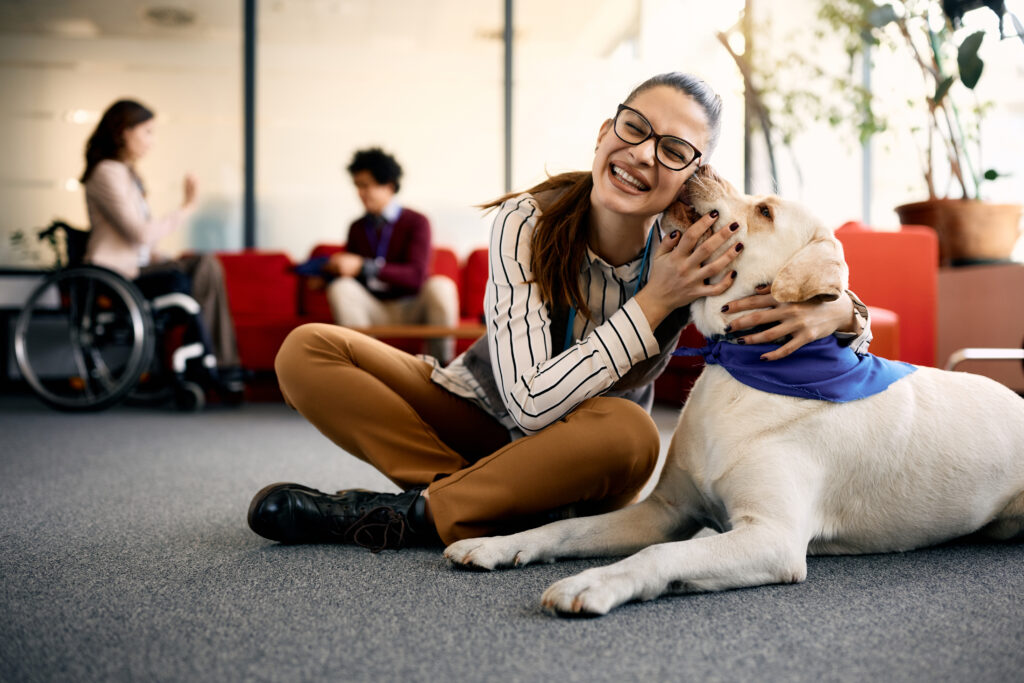when you foster a therapy dog it can be a rewarding and fulfilling experience. Not only do you provide a temporary home for a dog in need, but you also play a crucial role in helping them become a certified therapy dog. In this blog, we will explore the steps and considerations involved in fostering a therapy dog, from finding the right organization to preparing your home and supporting the dog’s training and socialization. Read on to learn how to foster a therapy dog.
What is a Therapy Dog

Therapy dogs are incredible animals that undergo specialized training to provide comfort, support, and companionship to individuals in a wide range of settings. Unlike service dogs, which are trained to assist individuals with specific disabilities, therapy dogs are trained to interact with diverse groups of people, such as those in hospitals, nursing homes, schools, or rehabilitation centers. These remarkable canines possess a calm and friendly temperament, making them ideal for offering emotional support and bringing moments of joy to those they encounter. Through rigorous training, therapy dogs learn how to navigate various environments and situations with ease, ensuring their ability to provide a positive impact wherever they go. Their presence can help reduce stress, anxiety, and feelings of loneliness, while also improving mood and enhancing overall well-being for the people they interact with. Whether it’s a gentle nuzzle, a wagging tail, or a warm snuggle, therapy dogs have a unique ability to bring comfort and happiness to those in need.
Types of Therapy Dogs
Therapy dogs come in various types, each with its own unique set of skills and qualities, which is extremely important to understand when you foster a therapy dog. One type is the facility therapy dog, which is typically found in settings like hospitals, nursing homes, and rehabilitation centers. These dogs are trained to provide comfort and companionship to patients and residents, helping to improve their overall well-being. Another type is the school therapy dog, which is often seen in educational environments. These dogs assist students by reducing anxiety, increasing focus, and promoting a positive learning atmosphere. Additionally, there are also crisis response therapy dogs, who are specially trained to provide emotional support and comfort to individuals during times of crisis or disaster. No matter the type, all therapy dogs share the common goal of bringing joy, comfort, and emotional support to those in need.
Your Job When You Foster a Therapy Dog

Now that you understand a little more about therapy dogs, you are probably wondering what exactly are your responsibilities when you foster a therapy dog? Lets take a look at what you can expect.
To Teach Basic Obedience
When you foster a therapy dog, one of your responsibilities will be to teach them basic obedience. This includes essential commands such as sit, stay, down, and come. By providing consistent training and positive reinforcement, you can help the dog develop good manners and behavior. Teaching basic obedience not only helps the dog become well-behaved and responsive but also prepares them for more advanced training required to become a certified therapy dog. It is important to be patient, understanding, and use reward-based training methods to create a strong foundation of obedience skills for the dog. With your guidance and support, the therapy dog will become better equipped to interact with individuals in various environments and provide comfort and support to those in need.
Socialization
Another important responsibility when you foster a therapy dog is socialization. Socializing a therapy dog involves exposing them to a variety of people, environments, and situations to help them become comfortable and confident in different settings. By introducing the dog to new experiences, such as meeting different individuals, encountering various sounds and smells, and navigating different environments, you help them develop the necessary social skills to interact with a wide range of people and handle different situations calmly. This socialization process is crucial for therapy dogs as it ensures they can provide comfort and support to individuals in various settings, without being easily overwhelmed or anxious. As a foster parent, you play a vital role in exposing the therapy dog to different social situations and helping them develop the necessary social skills to thrive in their role as a therapy dog.
Teach Commands Specific to Therapy Dog
A key task when you foster a therapy dog is to teach them specific commands such as “curb,” “door,” and “light switch.” These commands are essential for therapy dogs as they help them navigate various environments and perform specific tasks to assist individuals in need. By teaching these commands, you are equipping the therapy dog with the skills they need to excel in their role and provide the necessary support and comfort to those they encounter.
Transport Them to Appointments and Training Sessions
When you foster a therapy dog, you take on the important responsibility of transporting them to any necessary vet appointments or training sessions. This ensures that the dog receives proper medical care and remains up-to-date with vaccinations and check-ups. Additionally, attending training sessions is crucial for the therapy dog’s development and progress in becoming a certified therapy dog. By providing transportation, you play a vital role in ensuring the dog’s overall well-being and success in their therapy work.
Make an Impact and Foster a Therapy Dog
Fostering a therapy dog is not only a fulfilling experience but also a way to make a positive impact on the lives of others. By providing a temporary home and the necessary training, you help these incredible animals become certified therapy dogs, bringing comfort and joy to individuals in various settings. Whether it’s in hospitals, nursing homes, schools, or during times of crisis, therapy dogs have the power to make a difference. Through their calm temperament and unconditional love, they provide emotional support, reduce stress, and enhance overall well-being. So, if you’re ready to open your heart and home to a therapy dog, you’ll embark on a rewarding journey that will not only transform the life of the dog but also touch the lives of many individuals in need. Make an impact and foster a therapy dog.
